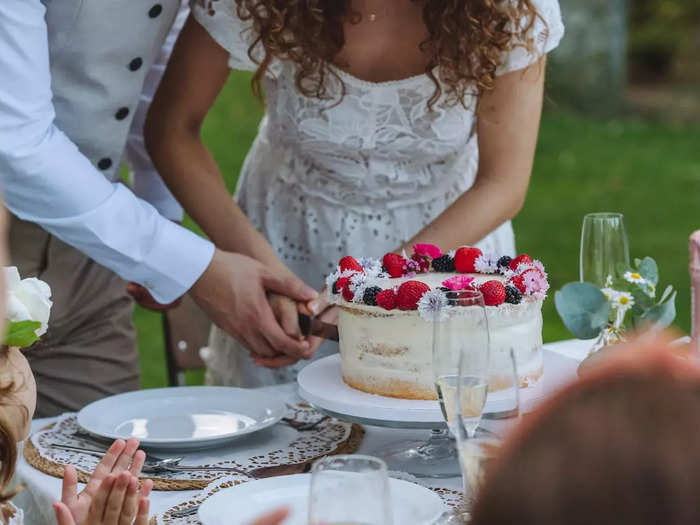
A dating coach said there are many red flags that can indicate whether a relationship will go the distance after marriage.Victor Dyomin/Getty Images
Wedding season is right around the corner.
If you're attending nuptials this year, there are a few signs to look out for to determine if the marriage will last, according to dating and relationships coach Anwar White.
White — who has advised clients on how to find love for 14 years and regularly shares dating advice with his over 580,000 followers on TikTok — outlined four red flags at weddings that foreshadow speedbumps ahead for the couple.
White shared the markers that a marital union may not be long for this world in a video posted on TikTok April 3. The clip has 1.6 million views.
Here, he breaks down each red flag to look out for at weddings this year.

White said that one of the biggest red flags that a couple won't work out in the long run involves wedding cake.
For some, it's tradition for the bride and groom to rub cake on each other's faces before the dessert is served to their guests. White said that paying attention to how the couple approaches the act of rubbing cake is key.
"If it's loving, if it's more of a caress, that's one thing," White said. If the cake rubbing is more forceful, he added, it indicates that the groom may harbor "deep-seated aggression" and is comfortable humiliating a partner.
"If a groom is willing to do that in front of your friends and family, I can't imagine what he's willing to do in the privacy of your own home," White said.

"When I see someone pulling focus to themselves, that lets me know that they're trying to make this event about them and not about the union," White said.
Some examples, he added, include if the bride or groom puts on a skit involving dancing or singing, or if there's a comedic interlude or show-off moment when walking down the aisle or during the reception.
"These are all moments where 'It's about me, it's about me, it's about me,'" he said. "That's something that I always look out for, and when I see it, I'm like, 'OK, I can see how this relationship is going to be.'"
White also said he pays attention to whether the bride or groom refers to the wedding as "my day" instead of "our day."

Some of the most successful marriages White has seen have started with an elopement or a more casual celebration.
By contrast, he said, some of the least successful couples hosted elaborate weddings, which can come across more like spectacles than authentic celebrations of love.
"A lot of brides really try to make the wedding as big as possible. And that is often a telltale sign that a bride is more focused on the wedding than they are on the marriage," White said. "What this means is 'I care about what other people think more than I care about the actual union.'"

People giving wedding speeches will devote most of their remarks to the person in the couple they know best, White said.
But somewhere in the speech, White added, there should be at least a mention of the other person.
If the speech-giver is solely focused on their person, he said it could mean one of two things. "One, they don't like the person," he said. "They are going by the old mantra of if you don't have anything good to say, don't say anything at all. Or two, they don't know the other person enough."
"What you want to see is positive things being said about the other person and how they represent themselves in your person's life," he said."
Friends and family can be better judges of whether a relationship will last than the people actually in the relationship.
White said he likes to refer to friends and family of his clients as their "love jury" because they can help individuals "have all of the perspectives" they need to make "the most informed decisions" about their romantic lives.

White knows his red flags aren't an exact science.
"None of these are always right," he said. "But these are things that you can look at and be like, 'OK, this is interesting.'"
Backing up his theories is years of experience, both as a relationships coach and a frequent wedding guest.
"I probably go to a wedding once a quarter," White said. "Maybe one out of five, sometimes two out of five, will have some of these markers in it."
 Should you be worried about the potential side-effects of the Covishield vaccine?
Should you be worried about the potential side-effects of the Covishield vaccine?
 India T20 World Cup squad: KulCha back on menu, KL Rahul dropped
India T20 World Cup squad: KulCha back on menu, KL Rahul dropped
 Sales of homes priced over ₹4 crore rise 10% in Jan-Mar in top 7 cities: CBRE
Sales of homes priced over ₹4 crore rise 10% in Jan-Mar in top 7 cities: CBRE

Copyright © 2024. Times Internet Limited. All rights reserved.For reprint rights. Times Syndication Service.